

The sugar conspiracy. Robert Lustig is a paediatric endocrinologist at the University of California who specialises in the treatment of childhood obesity.

A 90-minute talk he gave in 2009, titled Sugar: The Bitter Truth, has now been viewed more than six million times on YouTube. In it, Lustig argues forcefully that fructose, a form of sugar ubiquitous in modern diets, is a “poison” culpable for America’s obesity epidemic. A year or so before the video was posted, Lustig gave a similar talk to a conference of biochemists in Adelaide, Australia. Afterwards, a scientist in the audience approached him. Surely, the man said, you’ve read Yudkin. The scientific report guiding the US dietary guidelines: is it scientific? It has a big impact on the diet of American citizens, and those of most Western nations, so why does the expert advice underpinning US government dietary guidelines not take account of all the relevant scientific evidence?
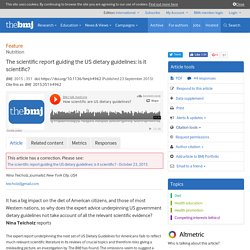
Nina Teicholz reports The expert report underpinning the next set of US Dietary Guidelines for Americans fails to reflect much relevant scientific literature in its reviews of crucial topics and therefore risks giving a misleading picture, an investigation by The BMJ has found. The omissions seem to suggest a reluctance by the committee behind the report to consider any evidence that contradicts the last 35 years of nutritional advice. The guidelines are based on a report produced by a dietary guidelines advisory committee—a group of 11-15 experts who are appointed to review the best and most current science to make nutrition recommendations that both promote health and fight disease.
Saturated fats Low carbohydrate diets. Cutting saturated fat doesn't necessarily reduce heart disease risk. Doctors have told patients for decades to eat less saturated fat – the predominant kind in red meat, butter and cheese -- as a way to prevent heart disease.
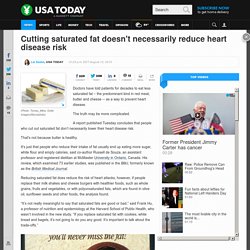
The truth may be more complicated. A report published Tuesday concludes that people who cut out saturated fat don’t necessarily lower their heart disease risk. That's not because butter is healthy. It's just that people who reduce their intake of fat usually end up eating more sugar, white flour and empty calories, said co-author Russell de Souza, an assistant professor and registered dietitian at McMaster University in Ontario, Canada. One in three patients who need statins agree to start using them following routine check-ups. Only one in three patients requiring statins are prescribed them by GPsFour-fifths of patients fail to show up for their mid-life health 'MOT'The MOTs assess the risk of heart disease, stroke, and type two diabetesPatients are should to be invited into their surgery to fill out a risk survey By Sophie Borland for the Daily Mail Published: 00:44 GMT, 12 June 2015 | Updated: 00:46 GMT, 12 June 2015.
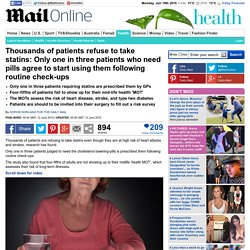
Se connecter à Facebook. Statin Smackdown: Doctors Disagree on Pros & Cons - The People's Pharmacy. There are few modern medications that have stirred such heated debate as statins.
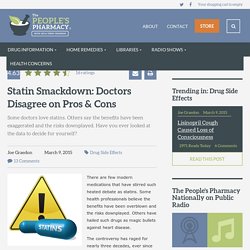
Some health professionals believe the benefits have been overblown and the risks downplayed. Others have hailed such drugs as magic bullets against heart disease. The controversy has raged for nearly three decades, ever since lovastatin (Mevacor) was approved in 1987. Since then, so much money has been spent on drugs like atorvastatin (Lipitor), fluvastatin (Lescol), pitavastatin (Livalo), pravastatin (Pravachol), rosuvastatin (Crestor) and simvastatin (Zocor) that it takes the breath away. Americans alone have spent well over $100 billion on statins. Many doctors tell patients that these cholesterol-lowering medications will protect them from a heart attack or stroke. Fat Head - Cholesterol. Safety, life-saving efficacy of statins have been exaggerated, says scientist. Hailed as miracle drugs when they hit the market two decades ago, statins, the cholesterol-lowering drugs prescribed to prevent heart attacks, are not as effective nor as safe as we have been led to believe, say Dr.
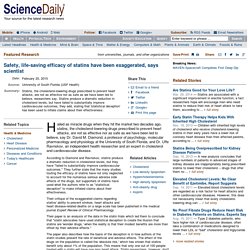
David M. Diamond, a professor of psychology, molecular pharmacology and physiology at the University of South Florida, and Dr. Uffe Ravnskov, an independent health researcher and an expert in cholesterol and cardiovascular disease. According to Diamond and Ravnskov, statins produce a dramatic reduction in cholesterol levels, but they have "failed to substantially improve cardiovascular outcomes. " The effect of a high-egg diet on cardiovascular risk factors in people with type 2 diabetes: the Diabetes and Egg (DIABEGG) study—a 3-mo randomized controlled trial. NuSI. Statins: Not for everyone...maybe not for anyone - The Blog of Michael R. Eades, M.D. Part 2 of the Heart of the Matter aired last night in Australia.
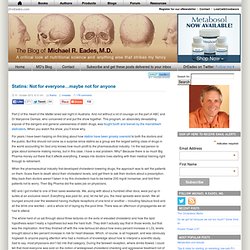
And not without a lot of courage on the part of ABC and Dr Maryanne Demasi, who conceived of and put the show together. This program, an absolutely devastating expose of the dangers and general uselessness of statin drugs, was fought tooth and toenail by the mainstream statinators. When you watch the show, you’ll know why. Statin Scam: People with Higher Cholesterol Live Longer than People with Low Cholesterol. Brian Shilhavy Health Impact News Editor Here is a fact that has been known for quite a long time, but it is still news to many people: People with higher cholesterol levels live longer than people with lower cholesterol levels.
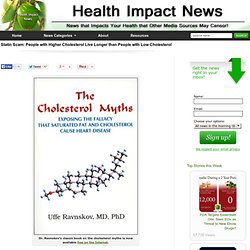
Read that again, slowly, and no, it is not a typo. The reason why this fact is not well-known in the general public is because it would put a huge dent into a $100 BILLION drug market for statin drugs – drugs that lower your cholesterol. With approximately one out every four Americans over the age of 50 currently prescribed a statin drug, a drug with very serious side effects, this is certainly one issue you should investigate yourself.
What the Research Says Concerning Cholesterol Levels and Mortality Rates. Expands Advice on Statin Risks. Get Consumer Updates by E-mail Consumer Updates RSS Feed On this page If you’re one of the millions of Americans who take statins to prevent heart disease, the Food and Drug Administration (FDA) has important new safety information on these cholesterol-lowering medications.
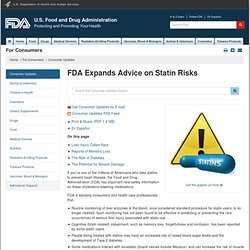
FDA is advising consumers and health care professionals that: Routine monitoring of liver enzymes in the blood, once considered standard procedure for statin users, is no longer needed. Statins and Heart Disease Prevention - American Heart Association Guidelines. Because these guidelines hadn't been updated in about a decade, the government and a committee of cardiologists decided to look at newer research on statins' benefits, as well as the impact of other risk factors on heart disease.
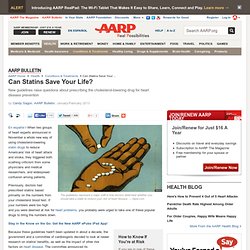
The committee announced its recommendations at last fall's annual meeting of the American Heart Association. The new guidelines focused not on specific cholesterol numbers but on four broad categories of people at risk of having either a heart attack or stroke if they didn't take a statin (see sidebar at right). There were few complaints about the first three categories but an outburst of criticism over the last one. That group included people who hadn't been diagnosed with heart disease, but who had at least a 7.5 percent risk of having a heart attack or stroke within the next 10 years, based on the guidelines' new risk calculator, which takes into account age, race, gender and heart risks.
Saturated fat's role in heart disease is a myth, says heart specialist. Macrobiosis, macrobiopathy? I hope we all remember Barnad's low fat vegan treatment for diabetes. This figure sums it up: By 74 weeks folks are not looking very well controlled. Certainly not compared to sustained LCHF. Now, if we crop it nicely we get: Which makes low fat veganism look pretty good, just so long as you limit your study to 12 weeks. Reevaluating Eggs' Cholesterol Risks. Why I've ditched statins for good. Top 11 Biggest Lies of Mainstream Nutrition. Image Credit: Flickr / U.S. Spacedoc. The Clue to Why Low Fat Diet and Statins may Cause Alzheimer’s. By Dr. Stephanie Seneff MIT Note: The topic of this essay is unrelated to my research at MIT.
Abstract Alzheimer’s is a devastating disease whose incidence is clearly on the rise in America. Heart of the Matter Part 1 - Dietary Villains. Heart of the Matter Part 2 - Cholesterol Drug War. The diet-heart hypothesis: a critique. [J Am Coll Cardiol. 2004. Cholesterol and Statins. STATIN NATION (First 13 mins) $TATIN NATION. It’s about time some people were straight with the statistics on statins. Yesterday, the National Institute for Health and Care Excellence (NICE) published draft proposals concerning the use of statins for the prevention of cardiovascular disease.
Previously, NICE advised doctors to recommend treatment in those with a calculated 10-year risk of cardiovascular disease of 20 per cent or more. Now, NICE is proposing that this threshold will be reduced to 10 per cent. I have not read the draft proposals, but I have read this piece in the Daily Mail penned by Professor Colin Baigent, a vocal promoter of statins and part of the Cholesterol Treatment Trialists (CTT) collaboration which has produced reviews that are frothing in their enthusiastic for statins.
In the piece in the Daily Mail, Professor Baigent is unequivocal in his support of statins: the benefits clearly outweigh any risks, even in those at relatively low risk of developing cardiovascular disease. The risks of statins, are utterly downplayed. The McGovern Report. Dietary fats, carbohydrate, and progression of coronary atherosclerosis in postmenopausal women. Cholesterol Facts vs. Myths. Cholesterol. Statins Sap Energy, Study Affirms. Statin drugs may leave users -- especially women -- feeling drained and tired on exertion, a clinical trial suggested.
Welcome to the UCSD Statin Effects Study. The UCSD Statin Study group, headed by Beatrice A. Golomb, MD, PhD, has actively been researching statin medications and their risk-benefit balance, including possible side effects. The Statin Insanity. The medical student was confused. How did we come to believe saturated fat and cholesterol are bad for us?
There aren’t too many topics that really get me riled up anymore. I’m too old and too busy to care about debating the merits of stem cell research, the legalization of marijuana, or Proposition 8. Don’t Give More Patients Statins. Research Finds Link Between Statin Use and Progressive Muscle Disease. September 2011 Each year, millions of Americans take statins, drugs collectively known to lower their blood cholesterol levels. Is the use of cholesterol in mortality risk algorithms in clinical guidelines valid? Ten years prospective data from the Norwegian HUNT 2 study - Petursson - 2011 - Journal of Evaluation in Clinical Practice.